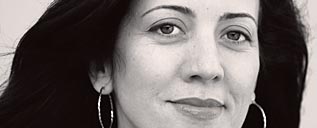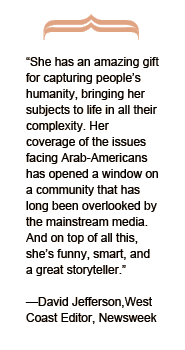 |
| COURTESY OF ANGELLA WELLS |
Lorraine Ali says she always wanted to be a writer, and that she always loved music. But not just any music: As an un-Valley Girl, she grew up on punk bands like X, Social Distortion, The Adolescents and Black Flag. So she wrote about them—and she did it well enough to break into LA Weekly in the early 1990’s and expand to GQ, The Los Angeles Times, Mademoiselle and Rolling Stone.
 Recognition came in 1996, when she won “best national feature story” at the Music Journalism Awards, and in 1997 when she was named music journalist of the year. By 2000, she had joined Newsweek, and in 2004 becamea senior writer. Recognition came in 1996, when she won “best national feature story” at the Music Journalism Awards, and in 1997 when she was named music journalist of the year. By 2000, she had joined Newsweek, and in 2004 becamea senior writer.
Week after week, she writes about the big names, from U2 and the Rolling Stones to Mariah Carey, Britney Spears and Eminem—as well as about theater, television, film and even circuses. As one of few women in music journalism, she says she tries to avoid statistics and jargon and write “much more about the feeling and the music itself, the album, being with the artist.”
MTV? She prefers the written word: “You can get more across,… more nuances, more breathing, more bits and pieces that mean different things for different people.”
Ali says her Arab–American heritage injected itself into her writing after her father’s death in 1989. Although she had read immigrant stories by Amy Tan and even Diana Abu-Jaber’s Arabian Jazz, her only encounter with her father’s native Iraq occurred in her early teens on a one-time visit to Baghdad. Self- ignorance, she says, compounded growing political frustration. After the 1995 Oklahoma City bombing, she says, “I was so angry that Arabs got blamed… and about how Arabs are portrayed.”
She began to refer to herself as a “secret Arab,” and at Newsweek, her early work was full of personal declarations. Speaking through another Arab woman whom she quoted, she said: “My goal is to learn about where I came from, then educate people as to who I am. God willing, I think we could change things.”
Her increasing awareness also led her to new subject matter. In a seminal 2001 article, “West Bank HardCore,” she used Palestinian rap and hip-hop music to help understand life under occupation. The tunes, she observed, are but a new, raw language of young poets, today’s Samih Al-Qasims and Mahmud Darwishes. “Hip-hop is also a way for them to connect with Palestinian culture, using rhymes to describe the conditions endured by their Arab countrymen.”
Last year, the rock critic kept rocking for Newsweek by spicing her mainstream cultural reporting with a critique of Fox TV’s series 24, a review of two Palestinian films, a major article on Islam in America and a cover story on Muslim women. Arab–American identity had come to mean a different viewpoint: “I am able to look at Arab culture and American Muslim culture. It’s not foreign to me. I know it. It’s in my blood.”
She has also, she admits, matured. “I used to blow up [over prejudiced articles]. Now, I think, ‘What can you do to present a more balanced view?’ And then I go find that opportunity.”
What’s next? Daily life and its secrets, she says. “Whenever I do an everyday story, it’s always about how interesting people’s everyday life is, what they’ve been through. It never ceases to amaze me. It’s all there, but it’s all secret, right inside them.” |